
Trying to run support for an ecommerce store can feel chaotic. You have customer questions flying in from email, live chat, social media, and contact forms. Drop one, and you might lose a sale or gain a very unhappy customer. When you're trying to manage it all manually, response times get longer, your agents get burned out, and your brand's reputation starts to feel the heat.
This is exactly why ecommerce help desk software exists. It’s built to bring all those conversations into one place, giving you a single command center for your entire support operation. In this guide, we'll walk you through the top 8 solutions for 2026 and help you figure out which one makes sense for your business.
What exactly is ecommerce help desk software?
At its heart, ecommerce help desk software is a tool that organizes all your customer conversations into one clean dashboard. Instead of jumping between your Gmail, Facebook messages, and a separate live chat app, everything gets funneled into a single, unified inbox.
The software takes every customer question, no matter where it came from, and turns it into a "ticket." You can think of a ticket as a case file for each conversation. It can be assigned to the right person on your team, tracked from start to finish, and marked as resolved once the customer is happy. This simple system stops messages from falling through the cracks and makes sure everyone gets a reply.
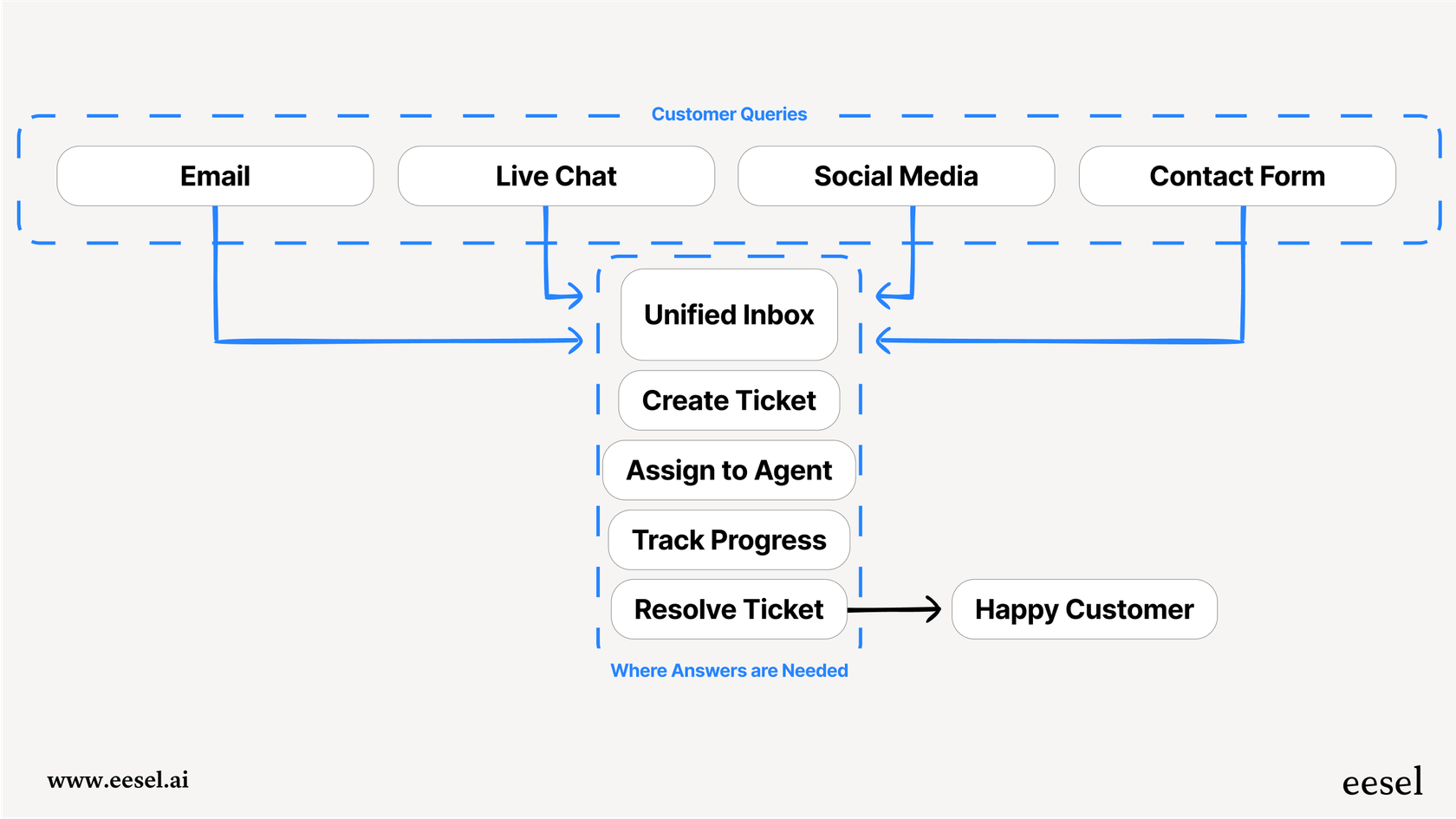
But modern help desks do a lot more than just organize tickets. The best ones come with handy features like automation to deal with repetitive questions, AI to help agents write better responses faster, and self-service portals so customers can find their own answers.
How we chose the best ecommerce help desk software
To separate the good from the great, we zeroed in on the features that actually matter to online sellers. Here’s the checklist we used to build this list of the best ecommerce customer support software 2026 guide:
- Ecommerce integrations: Does it play nice with platforms like Shopify or BigCommerce? Being able to pull in order data without switching tabs is non-negotiable.
- AI & automation features: Does it have smart tools that genuinely cut down on manual work? We looked for automated ticket routing, helpful AI response suggestions, and chatbots that don't drive customers crazy.
- Ease of use: How fast can your team actually start using it? We gave extra points to tools that don't require a programming degree or weeks of training to get going.
- Scalability: Can it grow with your business? The right tool should work just as well for a two-person team as it does for a company with a massive support department.
- Overall value: When you weigh the features against the price tag, does it feel like a smart investment for an ecommerce brand?
A quick comparison of the top ecommerce help desk software in 2026
Here's a quick side-by-side look at our top picks.
| Software | G2 Rating | Starting Price | Best For |
|---|---|---|---|
| eesel AI | N/A (New Platform) | $239/mo (annual) | AI-powering your existing help desk |
| Zendesk | 4.3/5 | $19/agent/mo | All-in-one enterprise-grade support |
| Gorgias | 4.6/5 | $10/mo | Deep Shopify & ecom integrations |
| Freshdesk | 4.4/5 | Free plan available | Small to mid-sized businesses (SMBs) |
| Help Scout | 4.4/5 | $50/mo | Shared inboxes and knowledge bases |
| Zoho Desk | 4.4/5 | Free plan available | Businesses using the Zoho ecosystem |
| HubSpot Service Hub | 4.4/5 | Free plan available | Integrating support with CRM & marketing |
| eDesk | 3.9/5 | $49/agent/mo | Marketplace sellers (Amazon, eBay) |
The 8 best ecommerce help desk software solutions
Let's dig into each platform and see what makes it stand out for online businesses.
1. eesel AI
eesel AI isn't another help desk you have to migrate your whole team to. It takes a different path by acting as a smart AI layer that plugs right into the tools you’re already using, like HubSpot, Zendesk, Freshdesk, or Gorgias. This means you can get the perks of cutting-edge AI without the giant headache of switching platforms.
Its main selling point is speed. You can get it running in minutes, not months. The setup is entirely self-serve with one-click integrations, so you don't need to loop in a developer. This is a refreshing change from competitors that often make you sit through long sales calls and complicated onboarding just to try the product.
eesel AI learns from all your existing knowledge, past tickets, help center articles, and even private documents in Google Docs or Confluence. This helps its AI-generated responses sound like they’re coming from your brand, not a generic robot. Even better, it has a simulation mode. Before the AI ever interacts with a real customer, you can test it on thousands of your past tickets to see exactly how it will perform and get a real forecast of your resolution rate. It’s a completely risk-free way to roll out AI.
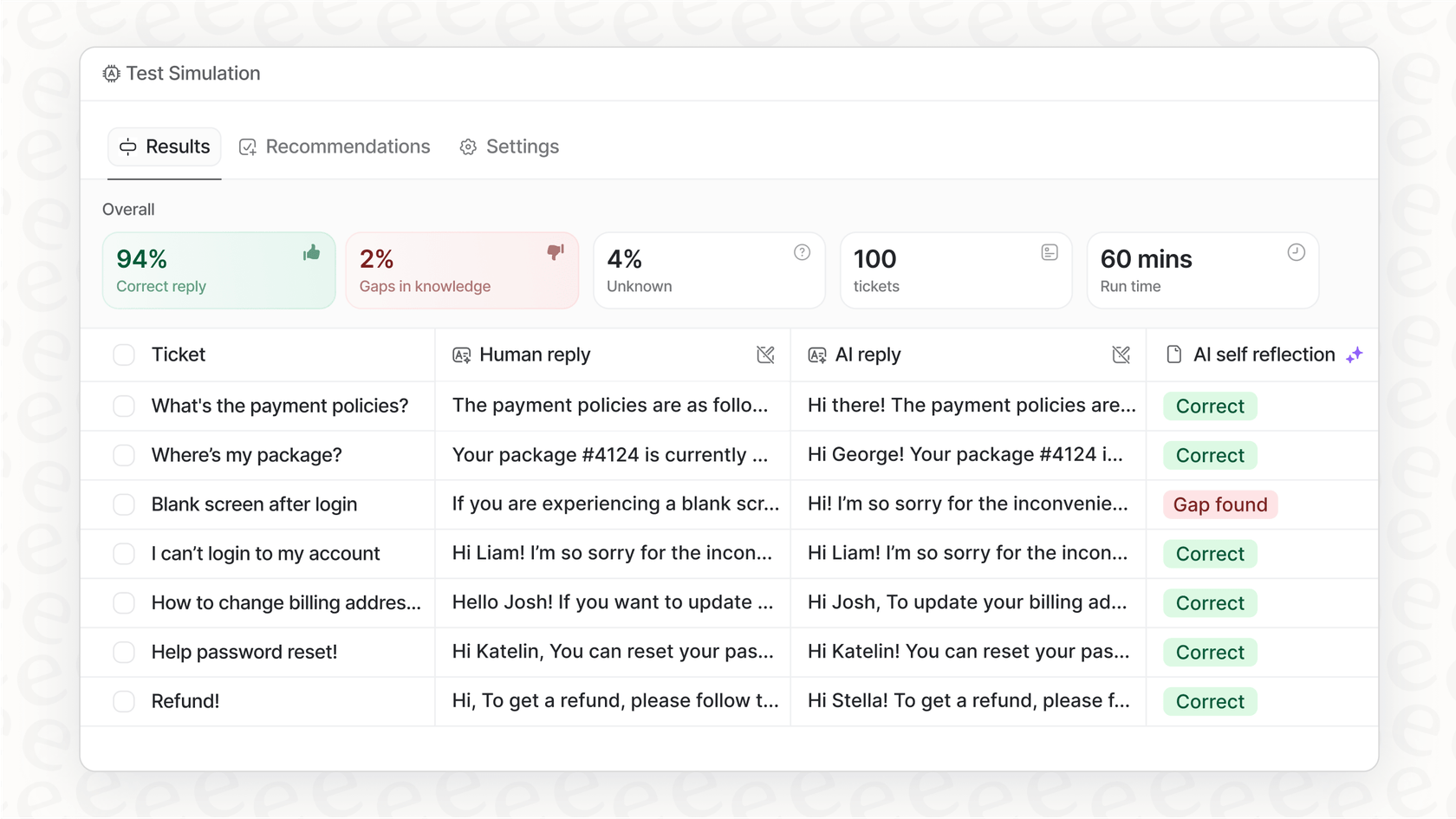
Pricing: Starts at $239/month (billed annually) with transparent pricing. No surprise per-resolution fees here.
- Pros: Integrates with your existing help desk (no need to rip and replace), goes live in minutes, offers a safe simulation mode, and unifies all your knowledge sources.
- Cons: It's not a standalone help desk (it needs one to plug into), and it's a newer platform on the market.
2. Zendesk
Zendesk is one of the biggest names in customer service, and for good reason. It's a powerful, scalable platform that's packed with features to handle almost any support situation. If you're looking for a true all-in-one solution that covers ticketing, a help center, and detailed reporting, Zendesk is a serious contender. It’s built to handle growth, whether you're a small startup or a massive enterprise.
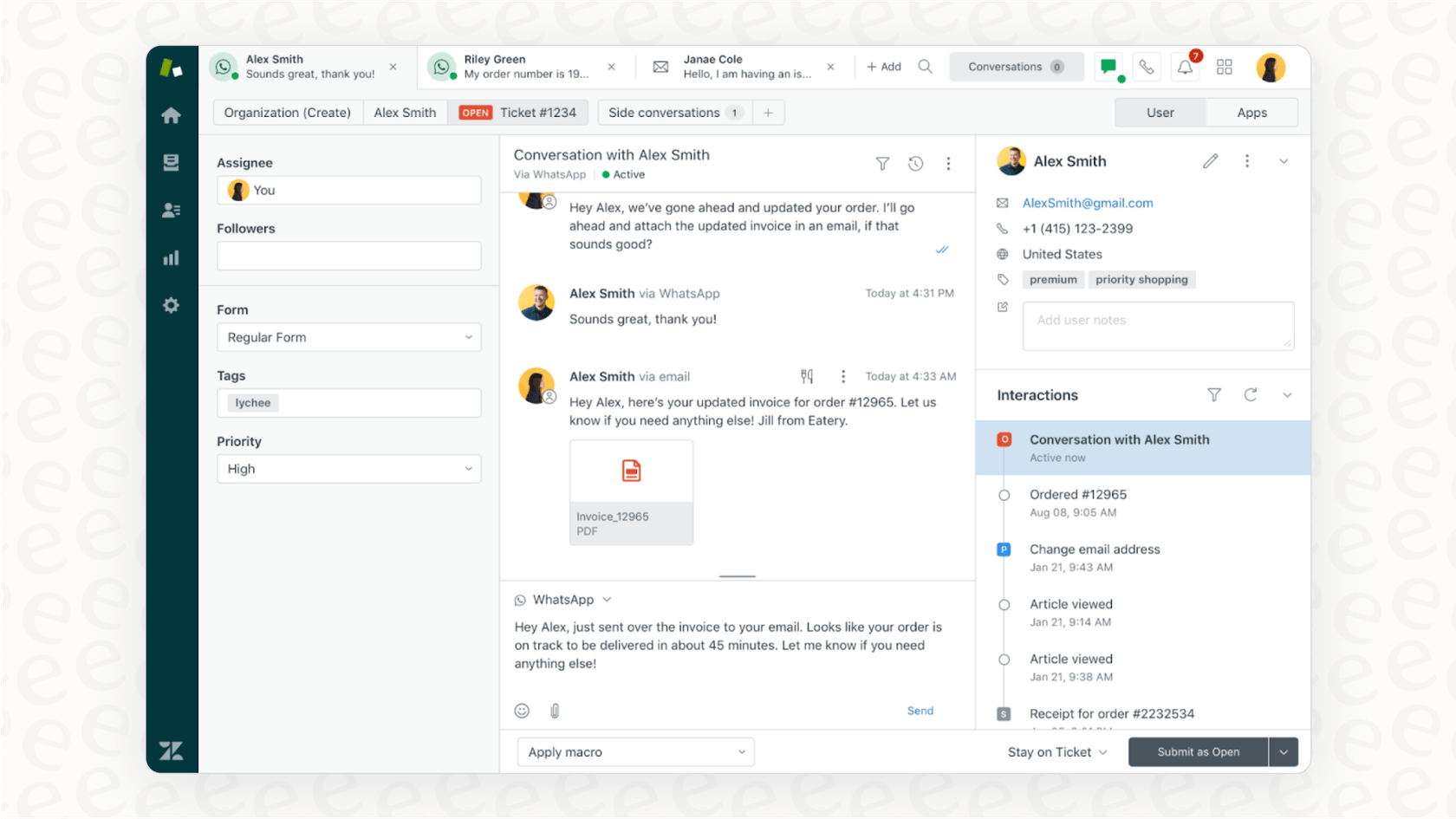
Pricing: Starts at $19 per agent, per month.
- Pros: Very scalable, has a huge marketplace of apps and integrations, and provides robust reporting and analytics.
- Cons: As a mature and comprehensive platform, it offers extensive features that may require a dedicated setup period to fully leverage its enterprise-grade capabilities.
3. Gorgias
Gorgias was built from the ground up specifically for ecommerce merchants. Its superpower is how deeply it connects with platforms like Shopify, Magento, and BigCommerce. It pulls customer and order info right into the agent's view, so they can see a shopper's entire history and even edit orders (like issuing a refund) without ever leaving the help desk. All that context makes for incredibly quick and personal support.
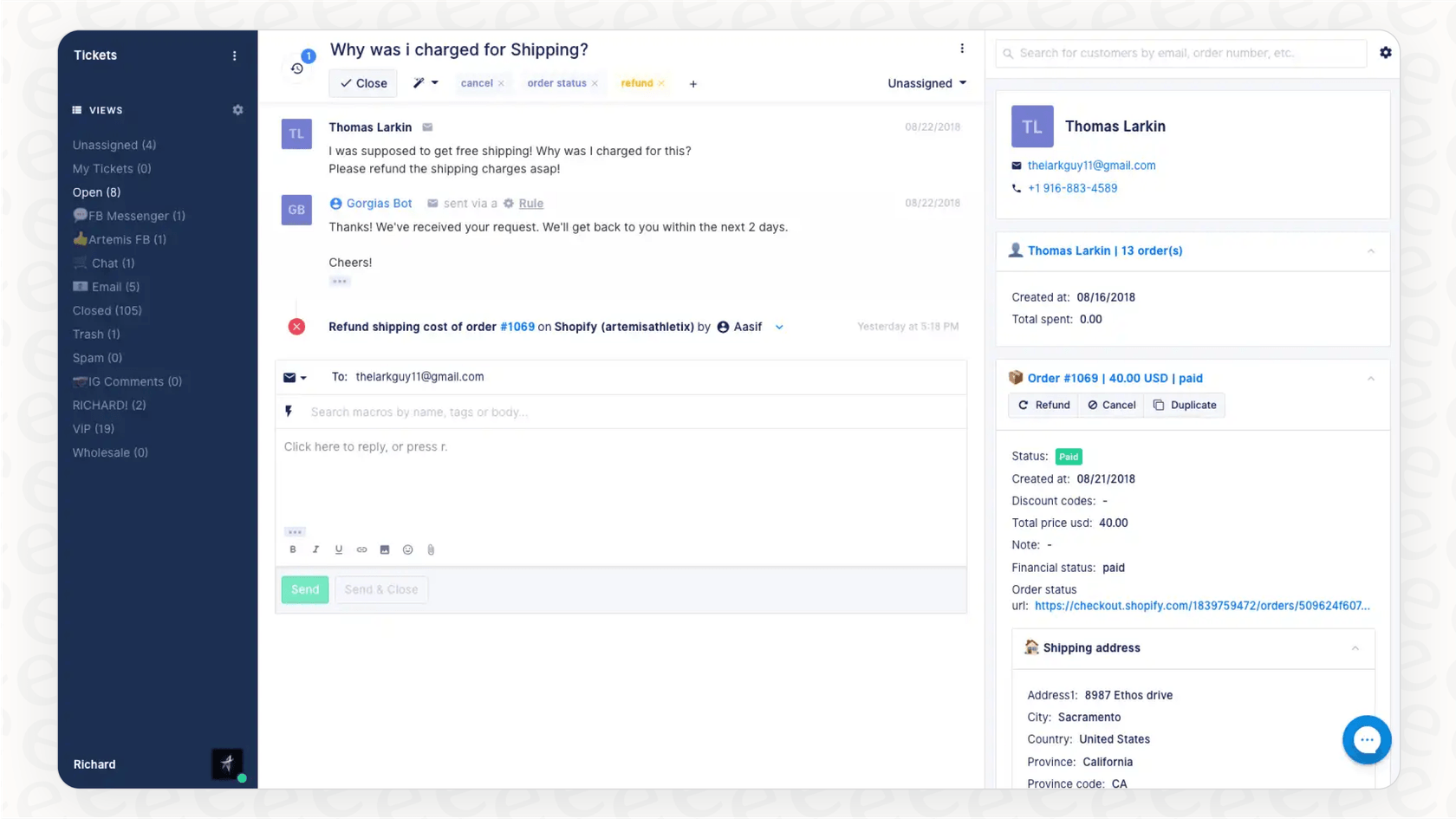
Pricing: Starts at $10 per month, with plans designed to accommodate stores at various stages of their journey.
- Pros: Fantastic ecommerce integrations, great at automating common ecommerce questions, and helps turn support chats into sales.
- Cons: Gorgias uses a ticket-based pricing structure that offers flexibility, allowing teams to align their costs with their actual support volume and growth.
4. Freshdesk
Freshdesk is a mature and reliable platform that offers an impressive balance of power and simplicity, which is why it's so popular with small and medium-sized businesses. It has a friendly interface and a comprehensive set of features, including omnichannel support, automation, and tools for team collaboration. One of its best perks is the generous free plan, which makes it super accessible for new startups looking for a trusted foundation.
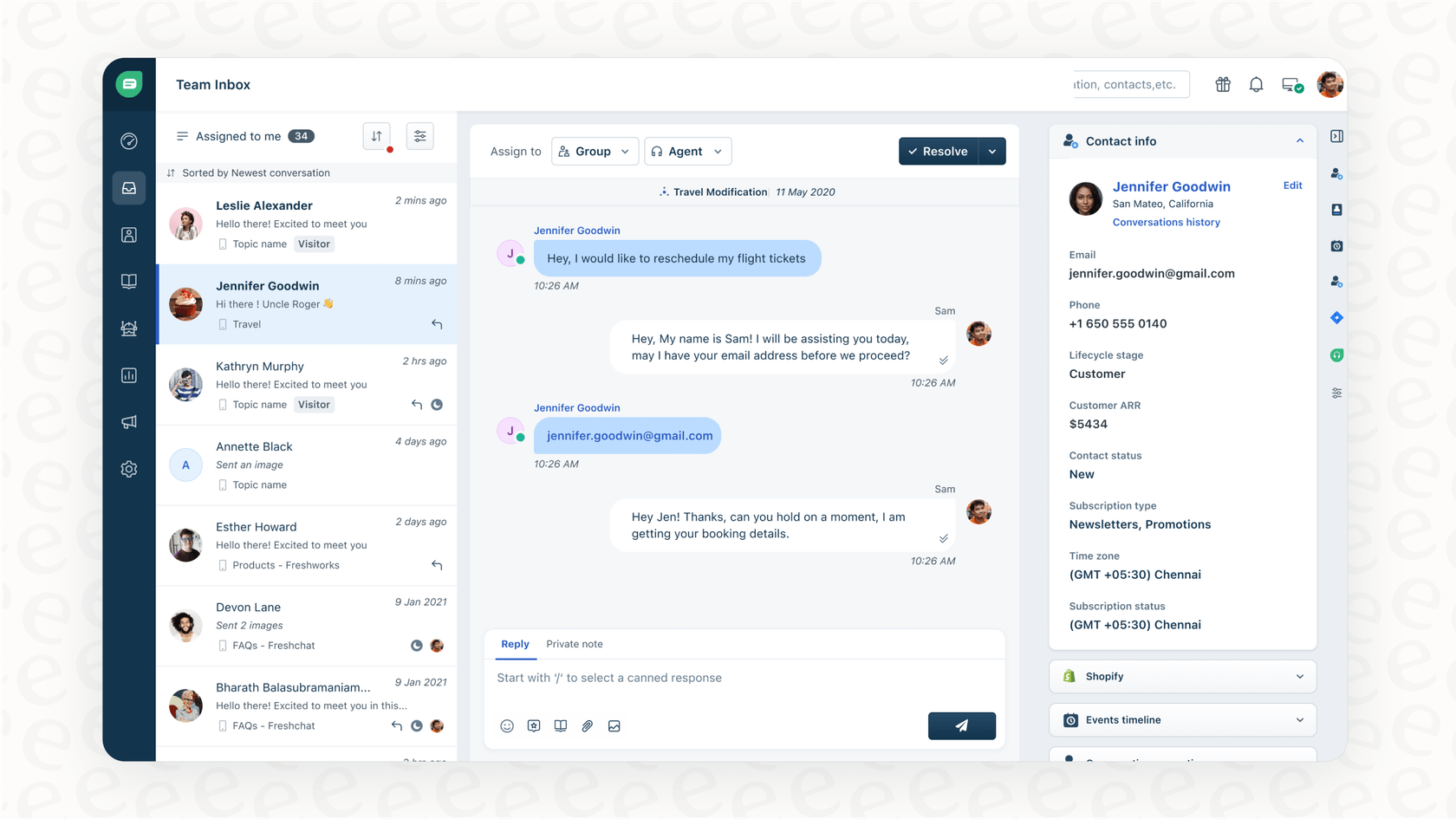
Pricing: Has a free plan for up to 10 agents; paid plans start at $15 per agent, per month.
- Pros: Easy-to-use interface, a great free plan for getting started, and strong support for multiple channels.
- Cons: Freshdesk uses tiered pricing to ensure businesses of all sizes have access to the right features, with advanced reporting available on its specialized plans.
5. Help Scout
Help Scout is all about making customer service feel more human. It’s a clean, simple tool that focuses on a collaborative shared inbox, live chat, and an easy-to-build knowledge base. If your team wants to keep a personal touch and avoid the overwhelming complexity of bigger platforms, Help Scout is a fantastic choice. It’s designed to feel like you're just replying to an email, which keeps things simple for everyone.
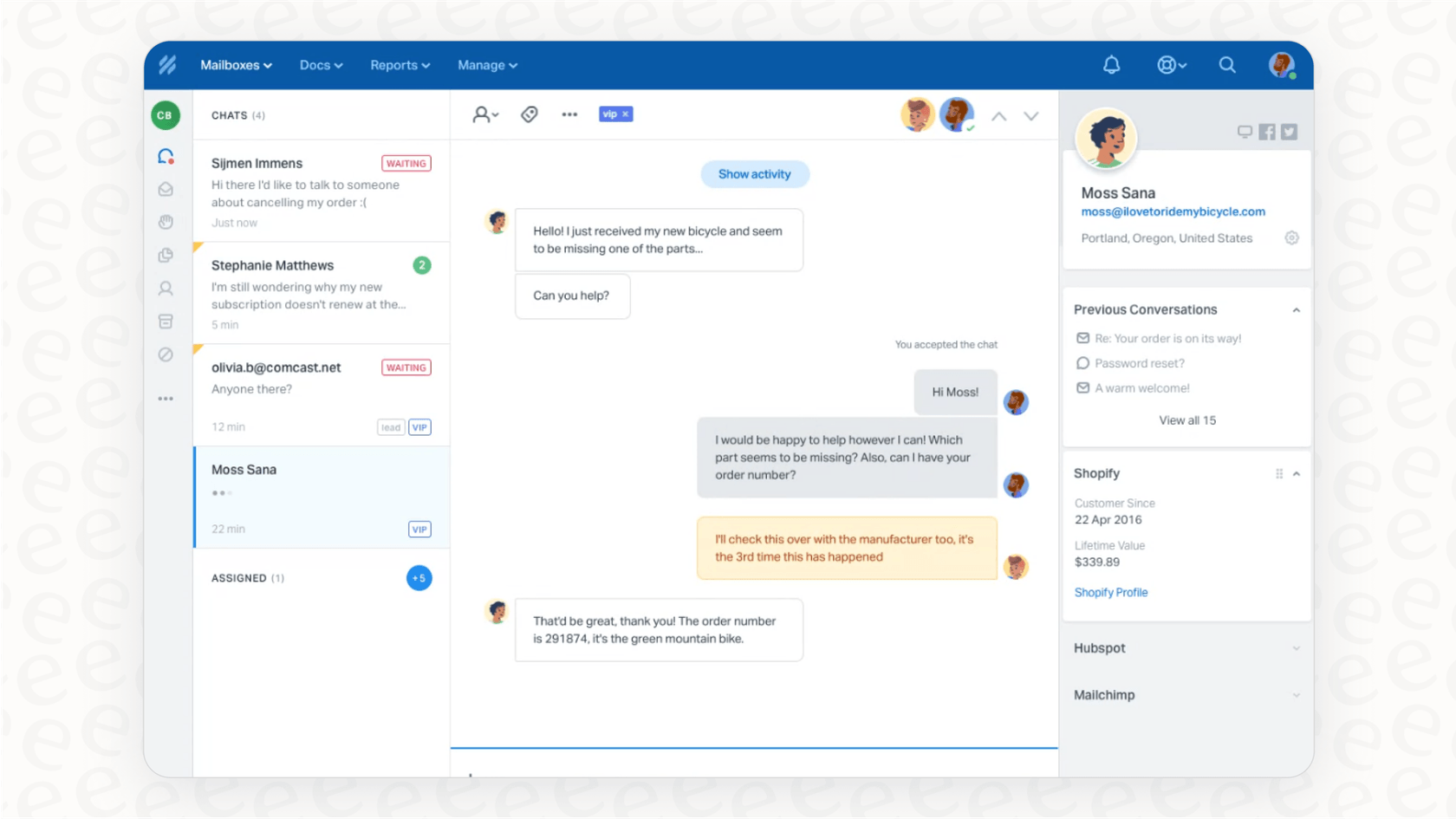
Pricing: Starts at $20 per user, per month.
- Pros: Very user-friendly and quick to learn, excellent for team collaboration, and has a great knowledge base features.
- Cons: It doesn't have some of the deeper automation or ecommerce-specific integrations you'd find in tools like Gorgias or eesel AI.
6. Zoho Desk
Zoho Desk calls itself the industry's first "context-aware" help desk. Its biggest strength is how well it works with the rest of the Zoho family of products, especially Zoho CRM. If your business is already running on Zoho, this help desk is a natural fit. It gives you a complete picture of the customer by pulling in context from sales and marketing. It also offers a surprisingly capable free plan.
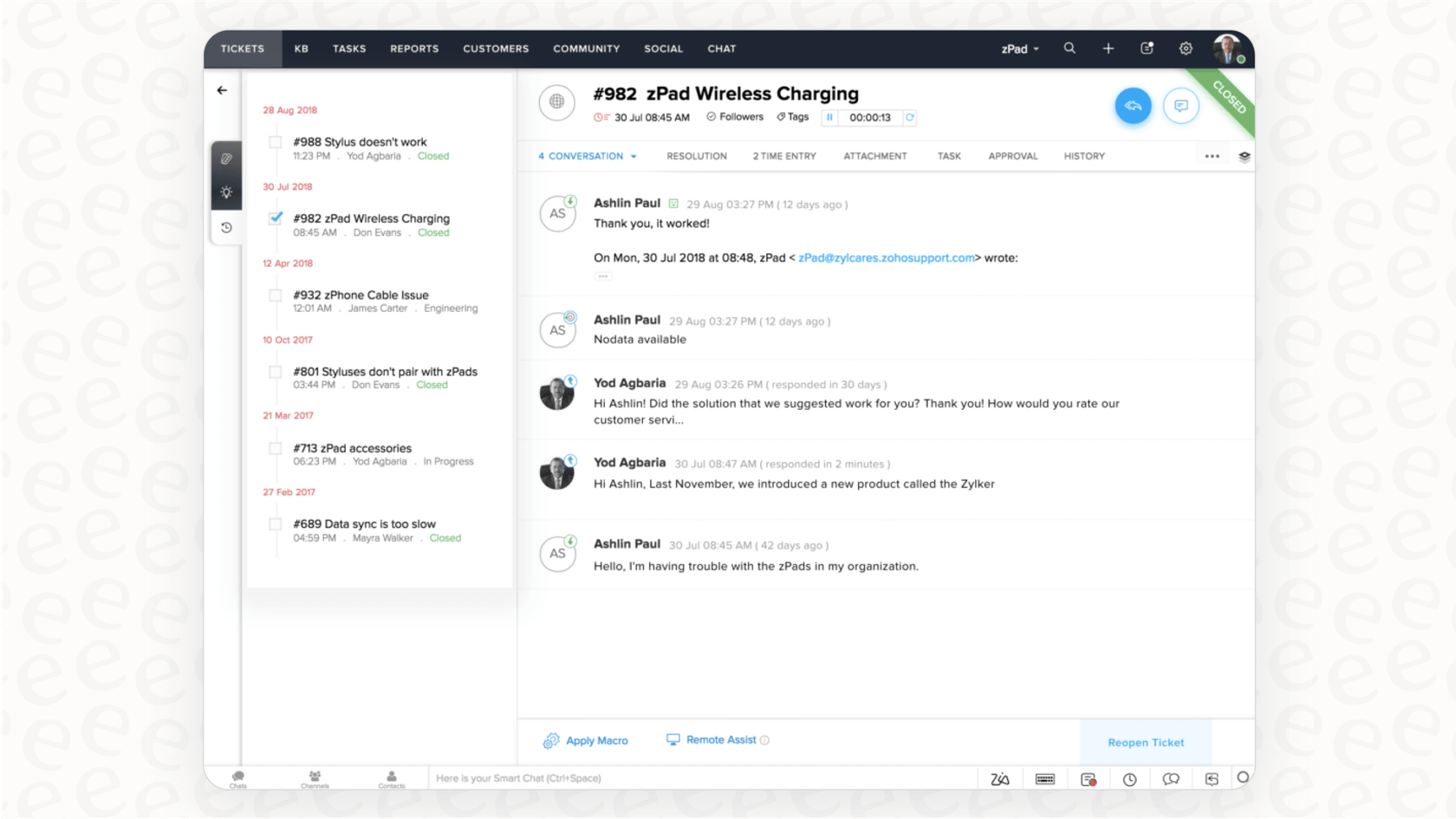
Pricing: A free plan is available for up to 3 agents; paid plans start at an affordable $7 per user, per month.
- Pros: Deep integration with Zoho CRM and other apps, very budget-friendly, and comes with an AI assistant named Zia.
- Cons: The interface can feel a little dated, and you get the most value out of it if you’re already committed to the Zoho ecosystem.
7. HubSpot Service Hub
Much like Zoho Desk, HubSpot Service Hub's biggest plus is its native connection to its world-class CRM. This link gives your support team a 360-degree view of every customer, from the first marketing email they opened to their most recent purchase. This makes it much easier to deliver personalized support. For businesses that want their support, sales, and marketing teams to work in lockstep, Service Hub is a mature, trustworthy option that powers customer service for thousands of companies.
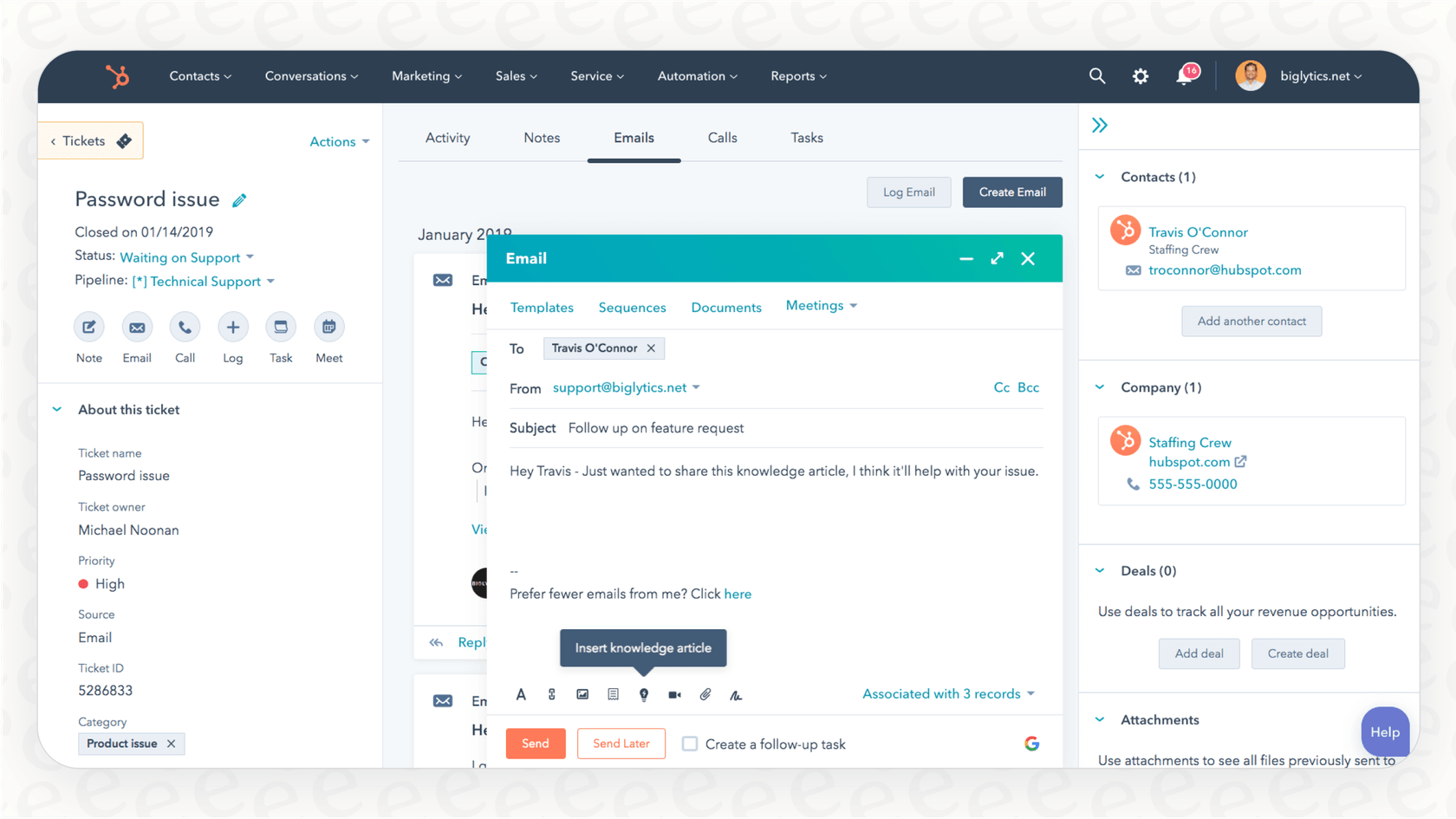
Pricing: Offers a bundle of free tools; paid plans start at $15 per user, per month.
- Pros: Unbeatable CRM integration, great for creating a single view of the customer, and has a solid set of free tools to get you started.
- Cons: HubSpot offers tiered plans to match different team sizes, and its service tools are designed to work seamlessly within the broader HubSpot ecosystem to provide a comprehensive support experience.
8. eDesk
eDesk is built for a very specific kind of online seller: those who sell across multiple marketplaces like Amazon, eBay, and Walmart. Its main job is to pull all customer messages from these different platforms into one central inbox. If a big chunk of your revenue comes from marketplaces, eDesk can be a huge time-saver, freeing you from logging into half a dozen different seller accounts to answer questions.
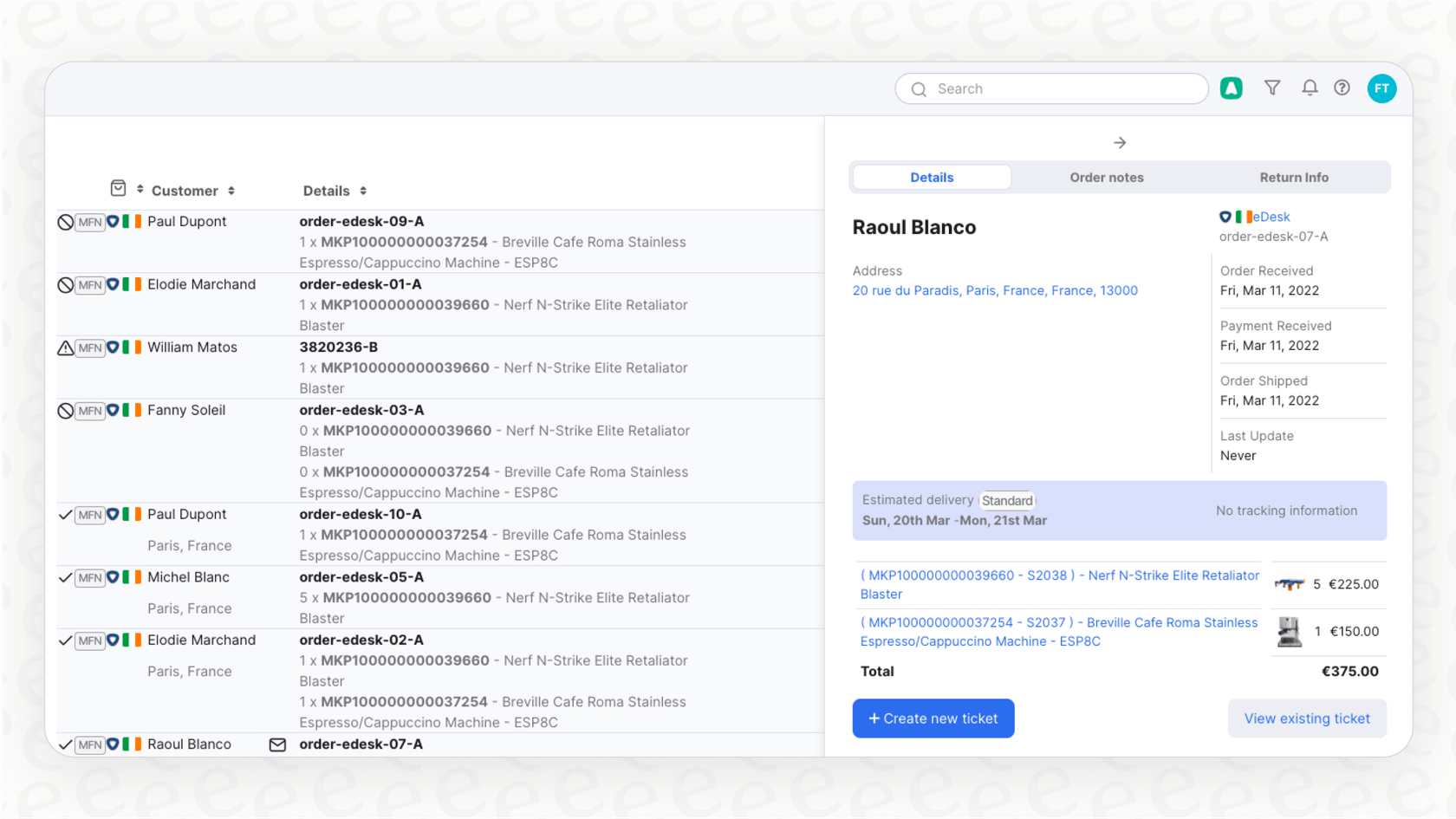
Pricing: Starts at $49 per agent, per month.
- Pros: Connects to a wide range of popular marketplaces and consolidates all those channels effectively.
- Cons: It’s specialized for marketplace-heavy workflows, meaning direct-to-consumer (D2C) brands might spend more time customizing the interface for their specific needs.
This video provides a helpful overview of the best help desk systems, including options ideal for ecommerce businesses.
How to choose the right ecommerce help desk software for you
Feeling a bit overwhelmed by the options? Don't sweat it. Here are a few practical tips to help you pick the right tool for your store.
Augment your ecommerce help desk software, don't just rip and replace
Switching from one help desk to another is a notoriously painful job. It means retraining your entire team, migrating all your old conversations, and rebuilding your workflows from the ground up. Before you decide to start over, think about tools that can make your current system better.
Platforms like eesel AI are designed for exactly this. They plug into your current help desk and add a layer of powerful, trainable AI without forcing your team to abandon a tool they already know. If you are using an industry-standard platform like HubSpot or Freshdesk, eesel AI is a perfect way to enhance your existing setup.
Test ecommerce help desk software with your actual data
It’s easy to get wowed by a polished sales demo where everything works perfectly. But the real test is seeing how a tool handles your specific, messy, real-world customer questions. Don't make a final call until you see how it performs with your own data.
This is where simulation features are invaluable. For instance, eesel AI’s simulation mode lets you run its AI against thousands of your past support tickets. This gives you a real-world preview of its accuracy and resolution rate before it ever touches a live customer conversation, taking all the guesswork out of the equation.
Look for transparent ecommerce help desk software pricing
Be careful with per-ticket or per-resolution pricing models. They might look cheap upfront, but they create unpredictable costs that can easily get out of hand. Your support bill shouldn't go up just because you had a successful sales month.
Look for platforms that offer clear, flat-rate pricing or well-defined tiered plans. This keeps your costs predictable, even during busy seasons like Black Friday, and makes budgeting much easier as you grow.
The future of ecommerce help desk software is AI-powered, not just organized
Choosing an ecommerce help desk software in 2026 isn't just about finding a better way to organize tickets. It’s about finding a system that can automate tasks intelligently, learn from your data, and free up your human agents to focus on the complex, relationship-building conversations that create loyal customers.
Often, the smartest move isn't to replace the tools your team already likes, but to supercharge them with a layer of purpose-built AI.
Ready to see what AI can do for your support team? Try eesel AI for free and you can deploy a custom-trained AI agent for your help desk in just a few minutes.
Frequently asked questions
Yes, even small teams benefit from getting organized early. Many platforms offer free or affordable starter plans that unify all your customer conversations, prevent messages from getting lost, and help you establish good support habits as your business grows.
Deep integration with your ecommerce platform (like Shopify, BigCommerce, or Magento) is non-negotiable. This allows your support agents to view order history and customer data right next to a support ticket, which is essential for providing fast and contextual help.
Most leading platforms do, but the depth of integration varies greatly. Tools like Gorgias are built specifically for Shopify and allow you to edit orders or issue refunds from the help desk, while others may only show basic order information.
Switching help desks can be a major project that involves retraining your team and migrating historical data. It's often better to first look for tools like eesel AI that can add powerful features, like advanced AI, to the system you already use.
It saves time primarily through centralization and automation. Instead of checking multiple inboxes, everything is in one place, and you can create automated workflows and use AI to handle repetitive questions like "Where is my order?" instantly.
Pricing models can vary, but Zendesk offers versatile tiered pricing and resolution-based options that allow you to match your plan to your team's specific size and goals. This flexibility helps ensure you have the right tools to keep your costs stable as you grow.
Share this post

Article by
Stevia Putri
Stevia Putri is a marketing generalist at eesel AI, where she helps turn powerful AI tools into stories that resonate. She’s driven by curiosity, clarity, and the human side of technology.


